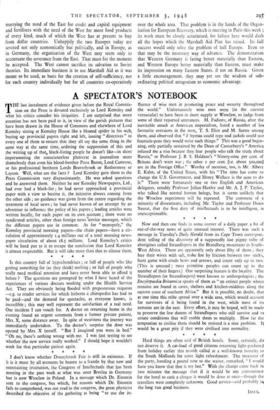A SPECTATOR 'S NOTEBOOK T HE last instalment of evidence given
before the Royal Commis- sion on the Press is devoted exclusively to Lord Kemsley and what his critics consider his iniquities. I. am surprised that more attention has not been paid to it, in view of the garish pictures that have been drawn in the House of Commons and elsewhere of Lord Kemsley sitting at Kemsley House like a bloated Wider in his web, buying up provincial papers right and left, issuing " directives " to every one of them to ensure that they all say the same thing in the same way at the same time, ordering the suppression of this and the writing up of that, black-listing people he doesn't like—in short impersonating the conscienceless plutocrat in journalism more shamelessly than even his blood-brother Press Baron, Lord Camrose, or his professional brethren Lords Beaverbrook or Rothennere or Layton. Well, what are the facts ? Lord Kemsley gave them to the Press Commission very dispassionately. He was asked questions and he answered them. Neither he nor Kemsley Newspapers, Ltd., had ever had a black-list ; he had never approached a provincial paper with a view to buying it, the initiative always coming from the other side ; no guidance was given from the centre regarding the treatment of local news ; he had never known of an attempt by an advertiser to influence the policy of his papers ; leading articles were written locally, for each paper on its own t account; there were no syndicated articles, other than foreign news service messages, which the different papers use in common. As for "monopoly," the Kemsley provincial morning papers—the chain papers—have a cir- culation of approximately 1.4 millions out of a total morning news- paper circulation of about 18.5 millions. Lord Kemsley's critics will be hard put to it to escape the conclusion that Lord Kemsley is almost respectable. But it will take more than that to silence them.
* *


































 Previous page
Previous page